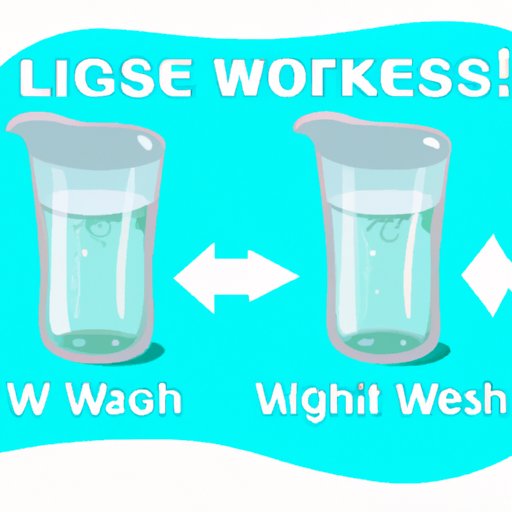
Introduction
Water is essential for our health and well-being, and it’s also a crucial component in any weight loss plan. The benefits of drinking water when trying to lose weight are vast, including an increased metabolism and decreased appetite. In this article, we will explore how much water you should be drinking, how to track your daily water intake and the best practices for staying hydrated while cutting calories. We will also cover myths and facts surrounding the connection between water and weight loss and creative ways to incorporate more water into your diet.
How drinking water can aid in weight loss
Drinking water can have a significant impact on weight loss, and there is ample scientific evidence to support this claim. For instance, studies show that drinking ice-cold water can boost metabolism by up to 30% for 90 minutes after drinking, burning up to 100 additional calories per day. Additionally, drinking water before meals can reduce appetite and calorie intake, promoting weight loss.
The importance of tracking daily water intake for weight loss
Tracking your daily water intake is essential to reaching your weight loss goals. Drinking enough water not only helps you feel fuller and more satiated, but it also ensures that your body is functioning correctly. Keeping track of your water intake can be as simple as setting a reminder to drink water at regular intervals throughout the day. You can also use water bottles with marked measurements to track how much water you’ve consumed.
Best practices for staying hydrated while cutting calories
Staying hydrated while on a calorie-restricted diet can be challenging, but there are several ways to make it easier. One of the best practices is to drink water before meals, which can help reduce calorie intake and improve digestion. Additionally, choosing water-rich foods such as fruits and vegetables can help you stay hydrated while also providing essential nutrients to your body.
Myth-busting: Is drinking water really crucial for weight loss?
While there is ample scientific evidence supporting the connection between drinking water and weight loss, there are also some myths surrounding this topic. For example, there is no scientific evidence to support the belief that drinking water during meals interferes with digestion. Additionally, while drinking water can promote weight loss, it is not a magic solution that will transform your body overnight.
Creative ways to incorporate more water into your diet
Drinking plain water all day can be monotonous, but there are several creative ways to incorporate more water into your diet. Drinking herbal tea is an excellent option because it not only provides hydration, but many herbal teas also offer various health benefits. Eating water-rich fruits and vegetables such as watermelon, cucumber, broccoli, and oranges is another great way to increase your water intake while also getting essential nutrients.
How to ensure you’re drinking enough water when you’re always on the go
When you’re always on the go, it can be challenging to ensure you’re drinking enough water throughout the day. One of the best strategies is to carry a water bottle with you, so you always have access to water. You can also use phone apps to track your water intake and set reminders to drink water regularly.
Why drinking water is more important than ever when working out for weight loss
Proper hydration is essential when working out for weight loss. Studies show that even mild dehydration can impair workout performance and reduce the body’s ability to burn fat. Drinking water before, during, and after exercise can help improve workout performance and promote better weight loss results.
Conclusion
Water is an essential component of any weight loss plan, and drinking enough water can have a significant impact on your weight loss goals. It’s essential to track your daily water intake, stay hydrated while cutting calories, and incorporate creative strategies to get more water into your diet. By doing so, you’ll not only promote weight loss but also enhance your overall health and well-being.




